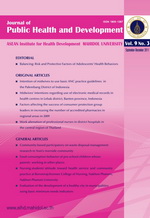Community-based participatory on waste disposal management research in Yom’s riverside community
Main Article Content
Abstract
This community-based participatory research was implemented to
create the public awareness in the waste disposal management among
riverside villagers and encourage the community to identify way to
solve the problem themselves. The study consisted of three phases,
which taked place continually. The
fi
rst phase was started with an investigation
of the riverside people’s focusing on waste disposal problem
and the second phase was to formulate solutions appropriate to the
lifestyle of people. The last phase was to evaluated the solution. Sato
community , Srisatchanalai district in Sukhothai province was
purposively selected for the site of study. 65 participants were chosen
to be participate in this study. Paired t-test and content analysis were
used to analyse the data.
The results showed that along Yom River road there were community
shops, and the places where they used to dump garbage could be
seen. Some of it was left on the riverbank. Many houses dumped their
garbage in these areas. Most of the rubbish was plastic foam, paper, and
leftover fruit. The result of empower program showed that: all the mean
scores of awareness and practice on waste disposal management were
signi
fi
cantly increased after attending the empowerment program. The
tangible result was that the 65 participants had applied the solution to put
into practice. Those activities were, for instance, waste separation, building
a garbage hole, and not dumping waste into the river. Finding the method
to solve the waste problem in this research was based on the community
based participatory. This framework can be used in other public-health
problem-solving research studies, because it is problem-solving in accord
with local wisdom and truth systems, which exist in nature.


